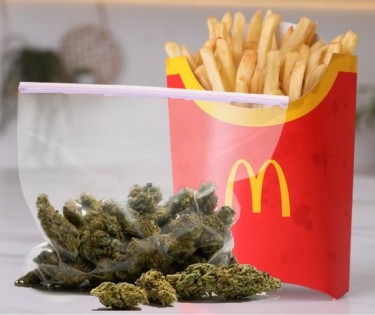
Reflecting on just a decade ago, the landscape of cannabis legality in the United States was vastly different from what it is today. Presently, 38 states have embraced either medical or recreational cannabis laws, encompassing 74% of the American population residing in areas where cannabis is legal. Furthermore, 79% of citizens live in counties with at least one cannabis dispensary.
The number of dispensaries that have sprung up across the nation is so high that it has surpassed the 13,500 McDonald’s stores by over 15,000.
It should come as no surprise that support for cannabis legalization has grown among Americans over time since the issue is becoming increasingly prominent in state legislatures’ political discussions and even inside the executive branch.
Strong and Growing Support for Cannabis Legalization Among Americans
The new research from the Pew Research Center confirms the broad support for legalizing cannabis in the United States. The organization regularly monitors the changing perspectives on cannabis legalization. 5,140 adult individuals took part in the poll, which was conducted from January 16 to 21, 2024.
According to the survey, over nine out of 10 Americans (88%), or the vast majority, support the legalization of cannabis for either medicinal or recreational use. Moreover, a sizable majority (57%) support the notion of legalizing cannabis for both recreational and medicinal purposes. Merely 32% of respondents are in favor of legalizing cannabis just for medicinal use, while only 11% are against legalizing it completely.
The poll also asked Americans to consider what they thought legalization would mean. The majority of respondents (52%) think that legalizing cannabis would help local economies; only 17% think otherwise, and nearly a third (29%) see no discernible change. When asked if legalizing cannabis for recreational use would improve or worsen the criminal justice system, 42% of respondents said it would, 18% said it would have no effect, and 38% said it would have no effect at all.
Diverging Perspectives on Cannabis Reform and Partisan Divides
The American public holds varied opinions on the legalization of recreational cannabis, particularly concerning its potential negative ramifications.
Regarding the impact on other drug use, respondents were split, with 29% believing that legalizing adult-use cannabis increases such usage, while 27% think it decreases it. A substantial portion (42%) perceive no discernible effect. Similarly, opinions diverge on the matter of community safety, with 34% expressing concerns that recreational cannabis legalization decreases safety, 21% believing it enhances safety, and 44% perceiving no notable impact.
Although bipartisan support for cannabis reform has increased gradually, a notable discrepancy persists between Democrats and Republicans. Democrats exhibit greater support for legalization, with 64% viewing it favorably for local economies and 58% believing it promotes fairness in the criminal justice system. Conversely, fewer Republicans share these sentiments, with only 41% and 27% expressing similar views, respectively.
Compared to their Democratic colleagues, Republicans are more likely to draw attention to the possible drawbacks of cannabis legislation. Republicans hold the view that it increases drug usage (42% vs. 17% for Democrats) and jeopardizes community safety (48% vs. 21% for Democrats).
While more study is needed to properly understand the long-term repercussions of cannabis reform, it is crucial to note that multiple studies have refuted claims that cannabis reform is related to increased drug use or risks, such as an increased risk of automobile accidents. Similarly, research indicates that legalization is not connected with increased juvenile cannabis use or changing adolescent views toward cannabis.
Continuity in American Attitudes Revealed
The demographic analysis conducted by the Pew Research Center reveals results that are in line with many previous research, which is to say that older persons are far less likely than younger adults to support the legalization of cannabis. Similar trends may be seen in how respondents see the consequences of legalizing cannabis, with younger respondents showing a stronger belief in the beneficial effects on regional economies and the equity of the criminal justice system.
The current polling data aligns closely with Pew’s previous reports. In 2022, the survey showed that 88% of American adults endorsed the legalization of medical or recreational cannabis, while 10% advocated for maintaining its illegality altogether.
In response to the survey findings, Paul Armentano, deputy director of the National Organization for the Reform of Marijuana Laws (NORML), attributed the escalating support for legalization to a diminishing sense of “buyer’s remorse” among voters regarding cannabis legislation.
Armentano commented, “As more states embrace legalization, public backing for this policy has surged significantly. This surge can be attributed to the successful implementation of legalization measures and a preference among voters for a regulated approach over the ineffective policy of cannabis prohibition. Elected officials who neglect to address the criminalization of cannabis do so at their political peril.”
The Economic Impact and Regulatory Challenges of Cannabis Legalization
The legalization of cannabis has opened up new economic prospects and problems. Proponents emphasize the opportunity for job development, tax revenue production, and expansion in auxiliary businesses such as agriculture, retail, and tourism. With the expansion of dispensaries and growing facilities, there is an increase in job prospects, ranging from retail sales to cultivation and distribution. Furthermore, states that have legalized cannabis have seen significant tax revenues pour into government coffers, which can be used to fund a variety of public services and activities. However, along with the economic gains come regulatory complications.
Managing the cannabis business requires managing a wide range of logistical, legal, and social challenges. To supervise the processes of cultivation, distribution, retail sales, and consumption, states must set up extensive regulatory frameworks. Concerns about product potency, safety, labeling, advertising, and accessibility by minors are all included in this. To make matters more complicated, there is a contradiction between federal and state legislation surrounding the legalization of cannabis. Federal prohibition presents serious obstacles to the development and legitimacy of the sector by complicating banking, taxes, interstate commerce, and law enforcement operations. Policymakers must navigate the complex web of state and federal rules while striking a balance between economic potential and public health and safety concerns as the cannabis industry continues to grow.
Bottom Line
The landscape of cannabis legalization in the United States has undergone a significant transformation over the past decade, with the majority of Americans now supporting its legalization for either medicinal or recreational use. The surge in support can be attributed to the increasing prevalence of cannabis-related discussions in political arenas and the demonstrable economic benefits observed in states where legalization has been implemented. However, despite widespread support, there remains a divergence of opinions on the potential consequences of cannabis reform, particularly along partisan lines. While Democrats tend to view legalization favorably, Republicans are more cautious and highlight potential negative impacts. As the cannabis industry continues to evolve, policymakers face the challenge of reconciling economic opportunities with regulatory complexities and public health concerns.
CANNABIS IS TAKING OUT FAST FOOD, READ ON…
TRUE OR FALSE, THERE ARE MORE DISPENSARIES THAN MCDONALDS?
- SEO Powered Content & PR Distribution. Get Amplified Today.
- PlatoData.Network Vertical Generative Ai. Empower Yourself. Access Here.
- PlatoAiStream. Web3 Intelligence. Knowledge Amplified. Access Here.
- PlatoESG. Carbon, CleanTech, Energy, Environment, Solar, Waste Management. Access Here.
- PlatoHealth. Biotech and Clinical Trials Intelligence. Access Here.
- Source: http://cannabis.net/blog/news/of-americans-now-support-marijuana-legalization-in-new-pew-survey-a.-90-b.-70-c.-50-d.-30




